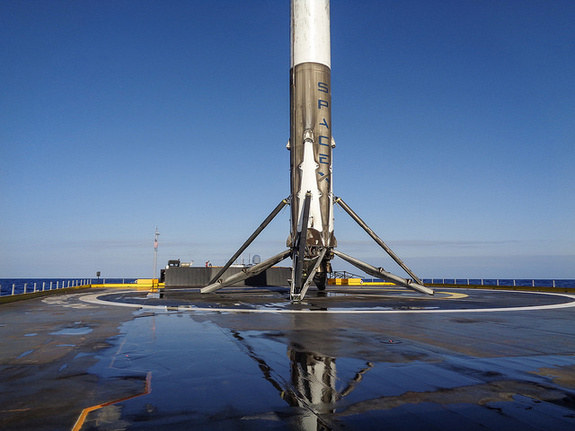This is what it looks like when a rocket blazes down out of a pitch-black sky and makes a pinpoint landing on a ship at sea.
On Friday (May 6), SpaceX brought the first stage of its Falcon 9 rocket down softly on a robotic ship called “Of Course I Still Love You,” which was stationed a few hundred miles off the Florida coast in the Atlantic Ocean. Three cameras aboard the “droneship” were rolling at the time, and you can see what they captured in this video of the epic nighttime rocket landing .
The touchdown came during SpaceX’s launch of the communications satellite JCSAT-14 from Cape Canaveral Air Force Station in Florida. The Falcon 9 sent JCSAT-14 to geostationary transfer orbit, 22,236 miles (35,786 kilometers) from Earth.
The booster stage was therefore coming back down at a much greater speed than during SpaceX’s one previous successful ocean landing, which occurred shortly after the April 8 launch of the company’s robotic Dragon cargo capsule to the International Space Station. (The space station flies in low-Earth orbit, about 250 miles, or 400 km, from Earth.)
“Three different angles of last week’s landing. Hottest and fastest landing yet,” SpaceX said via Twitter in a description of the video, which the company posted on YouTube today (May 9).

The first stage of SpaceX’s Falcon 9 rocket sits on the deck of the drone ship “Of Course I Still Love You” after its successful landing on May 6, 2016.
Credit: SpaceX
SpaceX has also landed a Falcon 9 first stage on terra firma, pulling off this feat during a satellite launch in December.
The goal of these landings is to help SpaceX develop fully and rapidly reusable rockets, a key goal for the company and its billionaire founder and CEO, Elon Musk. SpaceX aims to re-fly its landed rockets repeatedly, and could do so for the first time as early as this summer, Musk has said. (The first re-flown rocket will probably be the one that landed last month; the one that touched down in December will be put on display at SpaceX headquarters in Hawthorne, California.)
Follow Mike Wall on Twitter @michaeldwall and Google+ . Follow us @Spacedotcom , Facebook or Google+ . Originally published on Space.com .
Comments are closed.